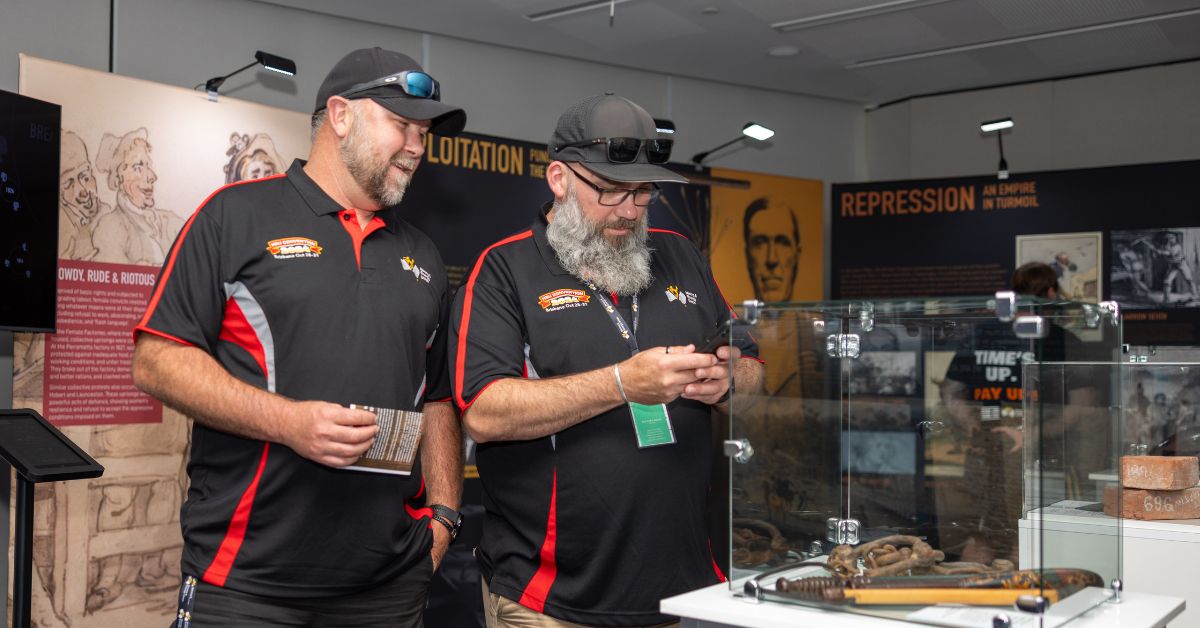November 21, 2024
Australia’s convict history is one of the defining aspects of our national identity, but our popular understanding of convicts as a downtrodden criminal class obscures a dynamic and inspiring history of political agitation and collective action.
Unshackled: The True Convict Story is a new mobile exhibition which upends the prevailing narrative of an unruly-yet-apolitical convict class by revealing the power and solidarity of unfree convict workers collectively resisting the system. Sponsored by the Mining and Energy Union, it is the latest outcome of Conviction Politics, a digital history project which uses thousands of digitised convict records to reveal a struggle for political and workers’ rights.
Using the latest data-mapping technologies, Unshackled shows that from the earliest days of settlement Australia’s first work force resisted exploitation through inventive solidarity in the face of maximum coercion and disempowerment. It reveals that approximately 4.5 billion hours of labour were stolen from the convict workforce between 1788 and 1870, literally building the foundations of the country on the backs of forced labour.
However, it also explores how the 160,000 convict workers fought back through strikes, sit downs, refusals to eat, sabotage, forming proto-unions, insubordination, escaping and rebellion. At its core, Unshackled is the labour movement’s story, taking the origins of Australian unions all the way back to the involuntary arrival of an unfree workforce on the First Fleet.
Unshackled also tracks the thousands of political prisoners who were transported to the colonies in the hopes of neutralizing the threat they posed to the British social order. These included thousands of Irish independence activists, members of the pro-democracy Chartist movement and early trade unionists.
These political prisoners also fought back in their place of exile, spearheading rebellions like Castle Hill in 1804, becoming union leaders, crusading journalists, even government ministers.
Most political convicts were industrial and agricultural workers protesting their impoverishment by the encroachment of private enterprise onto previously common land, lack of rights in the new, industrialised workplace and dehumanizing, de-skilling mechanization. Many of the most militant were miners, especially coal miners, and they brought their militancy with them when transported.
The Jarrow Seven were coal miners and leaders of the United Colliers of Northumberland and Durham, an early British miners’ union, who were transported to the Hunter Valley in 1832 following strike that successfully reduced their working hours from 18 to 12. They were involved in a go-slow action in 1836, when the company they worked for attempted to remove the monetary incentives for work in favour of scrip which could be redeemed in local stores.
The Jarrow Seven were an important bridge between the unfree convict coal miners in the early days of the industry in Australia, and the free immigrant miners who gradually absorbed them over the 19th century. One member of the Seven, Issac Ecclestone, is with introducing a token system for payment of skips filled, which greatly increased fairness in the mines. When he became incapable of working, Ecclestone was paid a stipend of 12 shillings a week by James Fletcher, a key figure in the formation of our Union in the Hunter Valley, suggesting that Ecclestone played some role in influencing the formation of a coal miners’ union.
Unshackled takes heart from Sally McManus’ comments in March 2017 that sometimes it is necessary to resist unfair and unjust laws. Political and social democracy, let alone the trade union movement, were not given freely to the Australian colonies by a caring mother country, but had to be fought for by brave, principled and persecuted men and women, first in their home countries and then again as convicts.
These protestors, reformers, radicals and revolutionaries should be honoured and remembered for sacrificing their own liberty, and sometimes their lives, for the freedoms and rights we take for granted.
Following a successful run at the Tasmanian Museum and Art Gallery and a pop-up event at the MEU’s National Convention, Unshackled will tour Australia, including regional coal hubs, throughout 2025-2027. In the meantime, hundreds of true stories, short documentaries, and other resources are available on the Conviction Politics online hub.

